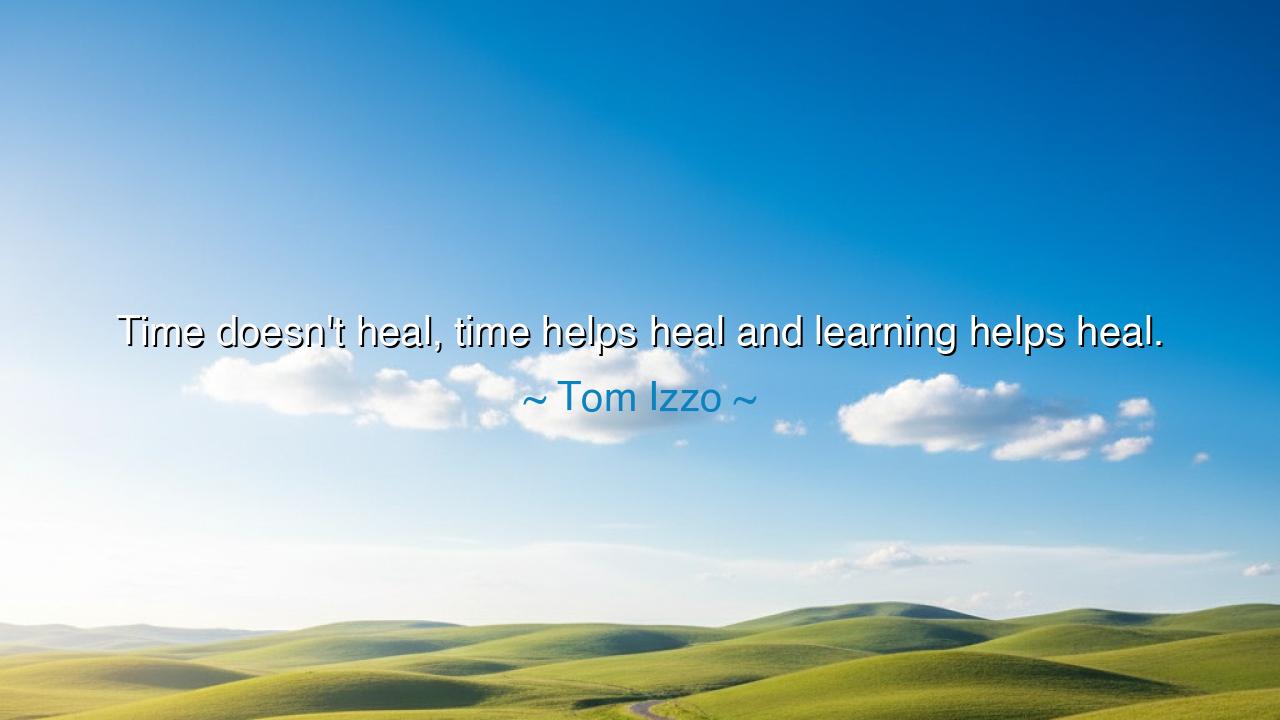
Time doesn't heal, time helps heal and learning helps heal.






“Time doesn’t heal, time helps heal and learning helps heal.” – Tom Izzo
In this simple yet profound reflection, Tom Izzo, a man known for his strength as a coach and his wisdom as a leader, unveils a truth that transcends both sport and suffering. He reminds us that time alone is not the healer we often believe it to be. Wounds — whether of the flesh or of the heart — do not close merely by the turning of days. It is what we do with time, how we grow within it, and what we learn from our pain, that brings true healing. His words echo with humility and understanding, born not from theory but from the lived experience of loss, perseverance, and reflection.
The origin of this quote lies in Izzo’s own life as a mentor and guide. He has led countless young athletes through triumph and heartbreak, both on the court and beyond it. In his years of leadership, he witnessed that time can dull pain but not erase it; that grief, failure, and disappointment linger unless one seeks meaning through them. And so, his wisdom crystallized: time helps, but it is not the cure; learning heals, for learning transforms suffering into strength, memory into wisdom, and pain into purpose.
The ancients, too, knew this truth. The philosopher Seneca once wrote, “Time does not bring wisdom to the foolish.” The Romans and the Greeks understood that time is but a vessel; it is the mind and heart that must fill it with meaning. A man may live a hundred years and remain unhealed if he refuses to confront his sorrow, just as another may find peace in a single season through reflection and understanding. Izzo’s words carry the same spirit: that healing is not passive. It is an act of courage — a choice to learn, to forgive, and to move forward with new insight.
Consider the story of Nelson Mandela, who spent twenty-seven years imprisoned in the shadows of a small cell. Time did not heal his anger or his wounds — it merely passed. But through learning, through the deep study of his enemies and the patient examination of his own heart, Mandela found peace and wisdom. He emerged not broken, but reborn. He used the years not to curse fate but to understand it, and through understanding, he became one of the greatest healers of his nation’s wounds. His life stands as proof that time helps heal, but learning completes the healing.
Time, when used with purpose, becomes a companion to the wounded soul. It grants space for reflection, for the waves of grief to rise and fall until the heart learns their rhythm. But if one drifts aimlessly through time — refusing to think, to grow, to face the truth — the wounds remain, hidden but festering. Learning, on the other hand, invites transformation. When we seek to understand our pain — why it came, what it teaches, and how it can strengthen us — we reclaim our power from suffering. Learning is the light that turns the passage of time into progress.
Izzo’s words are both gentle and demanding. They console those in pain, yet they also challenge them. He tells us that healing is not given; it must be earned through effort, humility, and reflection. To heal, we must become students of our own lives. We must learn from the betrayal that broke us, from the failure that humbled us, from the sorrow that hollowed us. Only then does pain become wisdom, and only then can time fulfill its promise.
So let this be your teaching: do not wait for time to heal you — work with it. Use its flow as the craftsman uses fire, shaping and refining the raw material of experience into strength. Seek learning in every loss, and wisdom in every wound. Read, reflect, and speak with those who have suffered before you. Let your pain become your teacher, not your master. Healing is not forgetting; it is understanding.
For as Tom Izzo reminds us, time is the soil, but learning is the seed. One without the other bears no fruit. The days may pass, but only the heart that learns will grow lighter. To heal, therefore, is not merely to endure — it is to rise wiser, kinder, and truer than before. And when that happens, time itself becomes sacred, for it has been used well — not to escape pain, but to transform it into wisdom.






AAdministratorAdministrator
Welcome, honored guests. Please leave a comment, we will respond soon